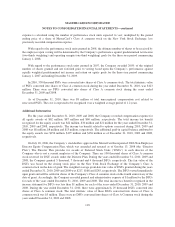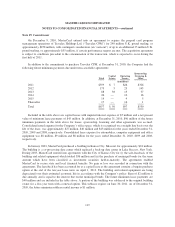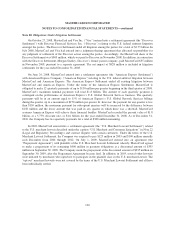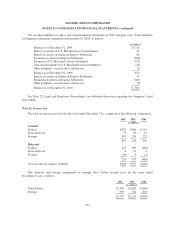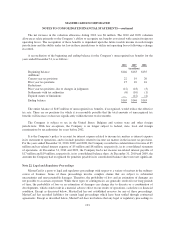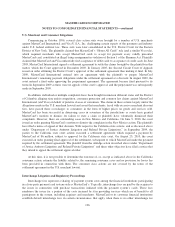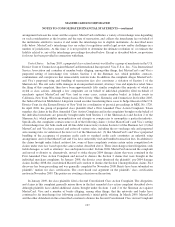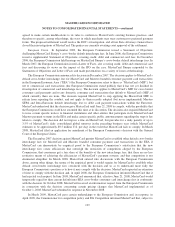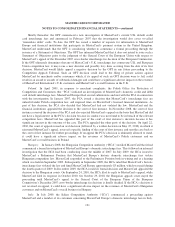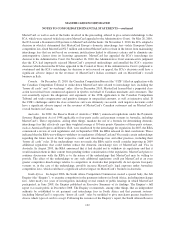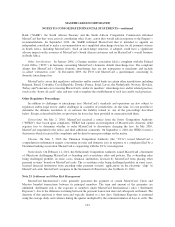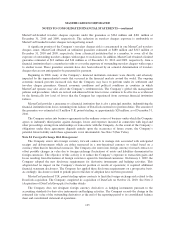MasterCard 2010 Annual Report Download - page 135
Download and view the complete annual report
Please find page 135 of the 2010 MasterCard annual report below. You can navigate through the pages in the report by either clicking on the pages listed below, or by using the keyword search tool below to find specific information within the annual report.MASTERCARD INCORPORATED
NOTES TO CONSOLIDATED FINANCIAL STATEMENTS—continued
In April 2005, a complaint was filed in California state court on behalf of a putative class of consumers
under California unfair competition law (Section 17200) and the Cartwright Act (the “Attridge action”). The
claims in this action seek to piggyback on the portion of the DOJ antitrust litigation discussed above with regard
to the district court’s findings concerning MasterCard’s CPP and Visa’s related bylaw. MasterCard and Visa
moved to dismiss the complaint and the court granted the defendants’ motion to dismiss the plaintiffs’ Cartwright
Act claims but denied the defendants’ motion to dismiss the plaintiffs’ Section 17200 unfair competition claims.
MasterCard filed an answer to the complaint in June 2006 and the parties have proceeded with discovery. In
September 2009, MasterCard executed a settlement agreement that is subject to court approval in the California
consumer litigations (see “—U.S. Merchant and Consumer Litigations”). The agreement includes a release that
the parties believe encompasses the claims asserted in the Attridge action. On August 23, 2010, the court in the
California consumer actions executed an order granting final approval to the settlement. The plaintiff from the
Attridge action and three other objectors have filed a notice that they intend to appeal the settlement approval
order. At this time, it is not possible to determine the outcome of, or estimate the liability related to, the Attridge
action and no incremental provision for losses has been provided in connection with it.
Currency Conversion Litigations
MasterCard International, together with Visa U.S.A., Inc. and Visa International Corp., are defendants in a
state court lawsuit in California. The lawsuit alleges that MasterCard and Visa wrongfully imposed an asserted
one percent currency conversion “fee” on every credit card transaction by U.S. MasterCard and Visa cardholders
involving the purchase of goods or services in a foreign country, and that such alleged “fee” is unlawful. This
action, titled Schwartz v. Visa Int’l Corp., et al. (the “Schwartz action”), was brought in the Superior Court of
California in February 2000, purportedly on behalf of the general public. MasterCard International, Visa U.S.A.,
Inc., Visa International Corp., several member banks including Citibank (South Dakota), N.A., Chase Manhattan
Bank USA, N.A., Bank of America, N.A. (USA), MBNA, and Citicorp Diners Club Inc. are also defendants in a
number of federal putative class actions that allege, among other things, violations of federal antitrust laws based
on the asserted one percent currency conversion “fee.” Pursuant to an order of the Judicial Panel on Multidistrict
Litigation, the federal complaints have been consolidated in MDL No. 1409 (the “MDL action”) before Judge
William H. Pauley III in the U.S. District Court for the Southern District of New York.
In July 2006, MasterCard and the other defendants in the MDL action entered into agreements settling the
MDL action and related matters, as well as the Schwartz matter. Pursuant to the settlement agreements,
MasterCard paid approximately $72 million to be used for the defendants’ settlement fund to settle the MDL
action and approximately $13 million to settle the Schwartz matter. In November 2006, Judge Pauley granted
preliminary approval of the settlement agreements, which were subject to both final approval by Judge Pauley
and resolution of all appeals. Subsequently in November 2006, the plaintiff in one of the New York state court
cases appealed the preliminary approval of the settlement agreement to the U.S. Court of Appeals for the Second
Circuit. In November 2009, Judge Pauley signed a Final Judgment and Order of Dismissal granting final
approval to the settlement agreements, and subsequently the same plaintiff in the New York state cases filed
notice of appeal of final settlement approval in the MDL action. Within the time period for appeal in the MDL
action, twelve other such notices of appeal were filed. Subsequently, several plaintiffs have requested to
withdraw their appeals. Briefing on the remaining appeals is ongoing. With regard to other state court currency
conversion actions, MasterCard has reached agreements in principle with the plaintiffs for a total of
approximately $4 million, which has been accrued. Settlement agreements have been executed with plaintiffs in
the Ohio, Pennsylvania, Florida, Texas, Arkansas, Tennessee, Arizona, New York, Minnesota, Illinois and
Missouri actions. At this time, it is not possible to predict with certainty the ultimate resolution of these matters.
125





